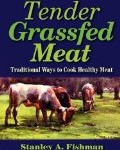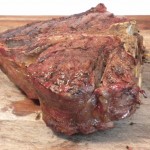Traditional Sea Salt Is a Vital Nutrient
By Stanley A. Fishman, author of Tender Grassfed Meat and Tender Grassfed Barbecue
Salt is one of the most vital human nutrients, and our ancestors knew this. Yet, the consumption of salt is now under attack.
The government is trying to reduce the amount of salt people consume, claiming that it will improve health and prevent strokes and heart disease.
Part of the Paleo movement is opposed to adding salt to food, believing that our Paleolithic ancestors did not add salt to food.
Many people believe salt is very harmful.
Because I advise against pre-salting grassfed meat in my cookbooks, some people assume I do this to reduce salt consumption.
All of these beliefs are mistaken. If we do not consume enough salt, our bodies do not function properly. Ultimately, if people do not get enough salt, they die.
The Two Types of Salt
While all salt originally came from the sea, it is available in different forms. It must be understood that two general types of salt are available. They are not the same.
The most common salt is factory salt, which is composed of salt that has been stripped of its minerals, and has had chemicals and flavoring agents (often including sugar) added. This salt is a pure white color. It is ground very fine and flows easily out of a salt shaker, almost never caking. This kind of salt did not exist before the twentieth century. This is by far the most common form of salt in the United States, used extensively in processed foods and by most people, who are usually unaware that the minerals have been stripped out, or that chemicals and even sugar have been added to the refined salt.
Then there is pure, unmodified salt from nature, often harvested from the sea, though it is also found in solid deposits on land. This salt, consisting of nothing but sea salt and minerals, is the traditional salt that humanity has used since the beginning. This traditional salt is the only salt I use or recommend.
Humans Have Added Salt to Food Since the Earliest Times
The belief that early humans did not add salt to food is mistaken. I remember reading about how the early colonists of the United States would choose a site for settlement. They would always have someone, usually a skilled hunter or scout, follow some of the wild animal trails in the area. They were looking for one thing they absolutely had to have, or they would not settle in that area—salt. Wild animals also need salt, and they would find salt deposits, usually called “salt licks.” The animals would find salt deposits, and get their salt by licking them. There is every reason to believe that early hunters and gatherers did the same, and found salt by following wild animals or their trails.
All the old writings on cooking, including those going back thousands of years, describe the addition of salt to food. Salt was greatly valued in ancient times, being more expensive than gold in some areas.
The reason is quite simple. Our ancestors knew that they needed to add salt to their food to live and thrive.
Our ancestors used salt to preserve and ferment foods, and created many artisanal foods based on the use of salt, including sauerkraut, ham, cheese, jerky, sausage, and countless others. Our ancestors ate far more salt than we do.
Why We Need Salt
Salt is one of the most crucial nutrients we need. Our bodies use salt for many body functions, including digestion, regulating blood pressure, creating and regulating hormones, proper adrenal function, proper functioning of the nervous system, and proper functioning of the brain, among others. (See The Salt of the Earth.)
If we do not get enough salt, these vital body functions are adversely effected. If you were to put anyone on a totally salt-free diet, they would eventually die, after much suffering.
We often crave salt, because our bodies so desperately need it. If you crave salt, it may be that you are not getting enough.
Is Salt Good? Or Bad? Or Both?
There is a belief in mainstream medicine, supported by some research, that associates salt intake with increased risk of heart disease or strokes. There is other research that disputes this theory, and shows great harm occurring from salt restriction. (See The Salt of the Earth.)
In the past when heart disease and strokes were very rare, traditional peoples and most humans consumed much more salt than people do today. And we know that the Japanese, who have the highest average salt consumption on earth, have among the highest average lifespans on earth.
So how do we know what is true, when the research is conflicting and history contradicts some of the research?
My own personal, anecdotal, common sense belief is this:
The difference may be in the type of salt consumed. Prior to the twentieth century, all the salt consumed on earth was traditional salt, without chemical additives, with the natural minerals left in. I believe that this kind of salt is not harmful, and is vital to our health. The studies done that support the idea that salt increases the risk of stroke and heart disease were all done at a time when factory salt was used. These studies are only relevant to the use of factory salt. To the extent that studies have found harm from salt consumption, it may be because of the chemicals, or the fact the minerals are stripped out, or both. So my own personal belief is that it is good, and important, to eat all the traditional salt I want, without fear. At the same time, I avoid factory salt as much as possible.
Please be aware that I am not a doctor, or a scientist, and I am not legally qualified to give any kind of health advice to anyone, so I am not giving advice—just stating my personal belief and what I do.
I do feel that the salt restriction now being pushed by the government, part of the medical profession, and the food industry is ill-advised, and I base this belief on history, and the excellent research done in this article, which I highly recommend. (See The Salt of the Earth.)
Salt and Grassfed Meat
I advise against salting most grassfed meat too far in advance. This advice is given solely because I have found that long pre-salting tends to toughen some grassfed meats. I do use plenty of traditional salt at the table, and will often salt meat just before it is cooked. The right amount of salt really brings out the flavor of food, and is absolutely vital to the taste, nutrition, and flavor of homemade broth.
I do enjoy the salt of the earth, and I do not fear it.
Related Post
Natural Salt vs. Industrial Salt
This post is part of Fat Tuesday, Monday Mania, Real Food Wednesday, Fight Back Friday, and Freaky Friday blog carnivals.
Sorry, the comment form is closed at this time.
Read more
« Real Food—The Best Way to Improve Schools
Traditional Food for Winter »


 Photos of recipes from the new book Tender Grassfed Barbecue
Photos of recipes from the new book Tender Grassfed Barbecue
 Photos of recipes from the cookbook Tender Grassfed Meat
Photos of recipes from the cookbook Tender Grassfed Meat
